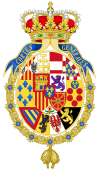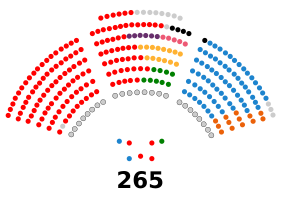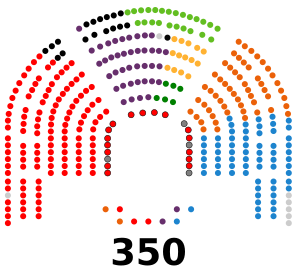13th Cortes Generales facts for kids
Quick facts for kids 13th Cortes Generales |
|||||
|---|---|---|---|---|---|
|
|||||
 |
|||||
| Overview | |||||
| Legislative body | Cortes Generales | ||||
| Term | 21 May 2019 – 24 September 2019 | ||||
| Election | 28 April 2019 | ||||
| Government | Sánchez I | ||||
| Senate | |||||
 |
|||||
| Members | 266 | ||||
| President | Manuel Cruz (PSOE) | ||||
| 1st Vice President | Cristina Narbona (PSOE) | ||||
| 2nd Vice President | Pío García-Escudero (PP) | ||||
| Congress of Deputies | |||||
 |
|||||
| Members | 350 | ||||
| President | Meritxell Batet (PSOE) | ||||
| 1st Vice President | Gloria Elizo (UP) | ||||
| 2nd Vice President | Alfonso Rodríguez (PSOE) | ||||
| 3rd Vice President | Ana Pastor (PP) | ||||
| 4th Vice President | Ignacio Prendes (Cs) | ||||
The 13th Cortes Generales was like a special meeting of Spain's main law-making body, called the Cortes Generales. The people who attended were chosen based on the results of a big election held on April 28, 2019. This group of lawmakers met for the first time on May 21, 2019. However, their time together was cut short, and they were officially ended on September 24, 2019.
Contents
How Members Were Chosen: The Election
The election that decided who would be part of the 13th Cortes Generales happened on April 28, 2019. This was the 13th general election held under Spain's 1978 Constitution.
In this election, the Spanish Socialist Workers' Party (PSOE) became the biggest party in both parts of the Cortes Generales:
- The Senate, which is like the upper house.
- The Congress of Deputies, which is the lower house.
It was the first time since 1993 that the PSOE was the largest party in the Senate. It was also the first time since 2008 that they were the largest in the Congress of Deputies. However, they didn't win enough seats to have a complete majority on their own.
Here's a quick look at how the different political groups did in the election:
| Alliance | Senate | Congress of Deputies | |||||
|---|---|---|---|---|---|---|---|
| Seats | +/− | Votes | % | Seats | +/− | ||
| PSOE | 123 | +81 | 7,513,142 | 28.67 | 123 | +38 | |
| PP | 54 | –73 | 4,373,653 | 16.69 | 66 | –69 | |
| Cs | 4 | +4 | 4,155,665 | 15.86 | 57 | +25 | |
| UP–ECP–EC | 0 | –16 | 3,751,145 | 14.32 | 42 | –29 | |
| Vox | 0 | ±0 | 2,688,092 | 10.26 | 24 | +24 | |
| ERC–Sob–ERPV | 11 | +1 | 1,024,628 | 3.91 | 15 | +6 | |
| JxCat–Junts | 2 | ±0 | 500,787 | 1.91 | 7 | –1 | |
| EAJ/PNV | 9 | +4 | 395,884 | 1.51 | 6 | +1 | |
| Others/blanks | 5 | –1 | 1,798,375 | 6.86 | 10 | +5 | |
| Total | 208 | ±0 | 26,201,371 | 100.00 | 350 | ±0 | |
Key Events and History
Both parts of the Cortes Generales, the Senate and the Congress of Deputies, started their work on May 21, 2019.
- In the Senate, Manuel Cruz from the PSOE party was chosen as the President.
- In the Congress of Deputies, Meritxell Batet (also from PSOE) became the President. She got support from other parties like Unidos Podemos-En Comú Podem and various regional groups.
Later in July 2019, the acting Prime Minister, Pedro Sánchez (from PSOE), tried to form a new government. To do this, he needed enough votes from the Congress. However, talks with another party, UP–ECP, didn't work out. This meant he couldn't get the votes he needed.
Because no government could be formed, Prime Minister Sánchez announced on September 17, 2019, that a new election would be held. This would be Spain's fourth election in just as many years! The 13th Cortes Generales was officially ended on September 24, 2019, to prepare for this new election.
Members of the Cortes Generales
The Cortes Generales is made up of elected representatives. These people are chosen by citizens to represent them and make laws for the country.
- The Senate had 266 members.
- The Congress of Deputies had 350 members.
These members work together to discuss important issues and create new laws for Spain.
See also
 In Spanish: XIII legislatura de España para niños
In Spanish: XIII legislatura de España para niños
 | May Edward Chinn |
 | Rebecca Cole |
 | Alexa Canady |
 | Dorothy Lavinia Brown |

